2023 UIA Annual Report

Letter From the CEO
Bridget Burns, Ed.D.
Dear Colleagues,
It’s incredible to think that the UIA is now celebrating its 10th year. We launched in October 2014 when President Obama announced our ambitious goal of awarding an additional 68,000 undergraduate degrees above baseline over the next decade.
As you know, we’ve already surpassed that goal in spectacular fashion. Our founding 11 members have collectively awarded an additional 143,000 degrees, more than doubling our initial target. This achievement reflects the tremendous teams at each campus, starting with the university presidents and chancellors who established the vision for the UIA, set it into motion, and have supported it every step of the way.
Degrees, of course, are only one marker of success. We’ve rolled out 10 multi-campus collaborative innovation initiatives and are currently harnessing everything we’ve learned to implement a DFW academic recovery project that has the potential to transform higher education well beyond the UIA.
We’ve also grown our network while maintaining our commitment to quality, collaboration, and accountability. Nine new campuses have joined our founding universities, each bringing fresh ideas and experiences to enrich our mission. Beyond our formal expansion, the University Innovation Lab is broadening access to our knowledge and resources.
The hidden gems of this effort are the UIA Fellows, who lead much of the day-to-day collaborative interaction across campuses and serve as UIA ambassadors at their institutions and beyond. We’re incredibly proud that many Fellows have moved on to other leadership roles throughout higher ed, amplifying our impact far and wide.
As we approach our 10th anniversary, we're asking ourselves, "What's next?" Our presidents and chancellors, who comprise the UIA's board, are engaged in this critical question. We intend to assess the current landscape, understand what our students, states, and nation need over the next decade, and build on our success to make the American Dream more broadly accessible.
We'll keep you updated as we embark on a thoughtful process to synthesize our learnings, refine our work, and clarify our unique contribution to the field. Rest assured, we will always be guided by our member institutions, with transparency and data-driven decisions at our core.
In fall 2024, we will create another UIA Summit—a culmination of a decade of innovation, collaboration, and transformative insights. And the event won't end there; it will catalyze ongoing collaboratives and momentum through post-event support and the University Innovation Lab.
Following the 2024 election, we will unveil our updated vision and our next audacious goal. It will inspire hope and come with credibility, given the accomplishments of our UIA leaders over the past decade.
Reflecting on nearly ten years of our UIA journey is surreal, but what's truly amazing is how much more we can achieve for students. A decade in, and we're just getting started.

Our Network Partners
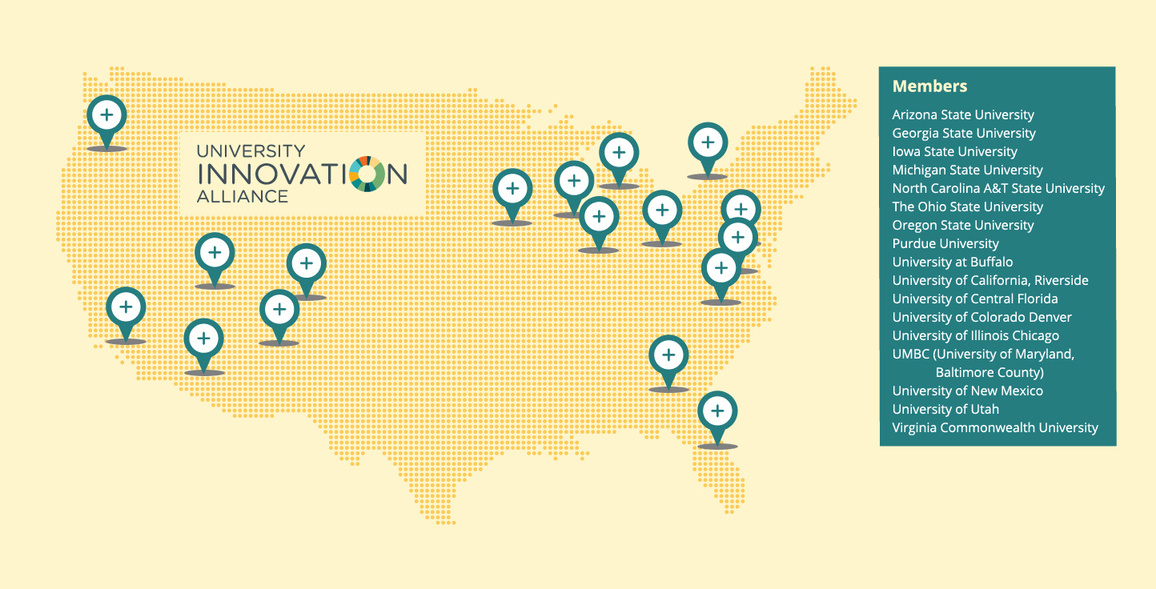
In 2023 the UIA welcomed two new institutions, bringing our network to 17: the University of New Mexico and the University at Buffalo. Collectively, UIA institutions now enroll approximately 520,000 undergraduates, including 164,000 Pell recipients and 180,000 students of color, and produce 114,000 annual bachelor's graduates.
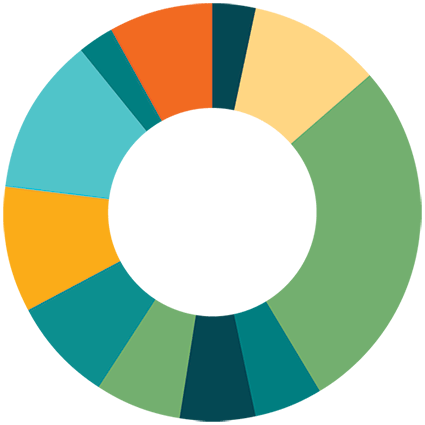
Impact, Scale, & Growth
UIA institutions are deeply committed to producing more low-income graduates, first generation and graduates of color across the country, and their efforts are paying off.
The founding UIA institutions have now produced 143,201 additional degrees above baseline projections - more than doubling their 2014 ten-year goal of 68,000.
Since our baseline year in 2012-2013 there has been:
- a 29% increase overall in annual graduates;
- an 89% annual increase in UIA graduates of color;
- a 41% annual increase in low-income graduates.
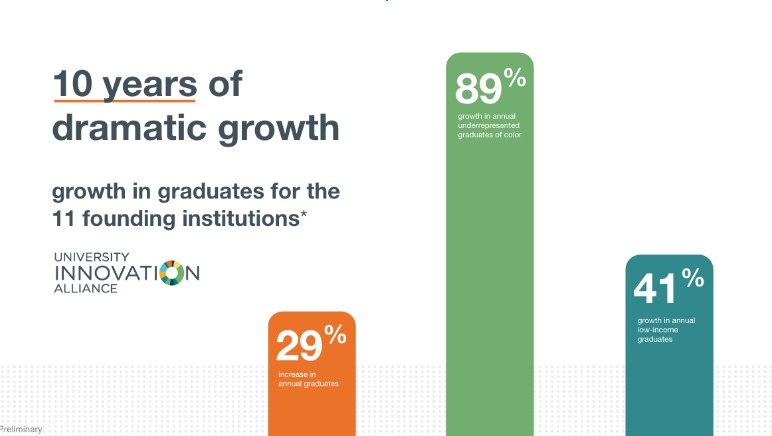
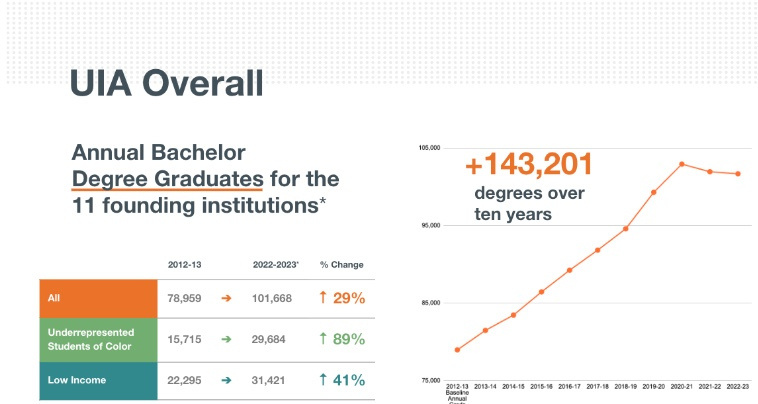
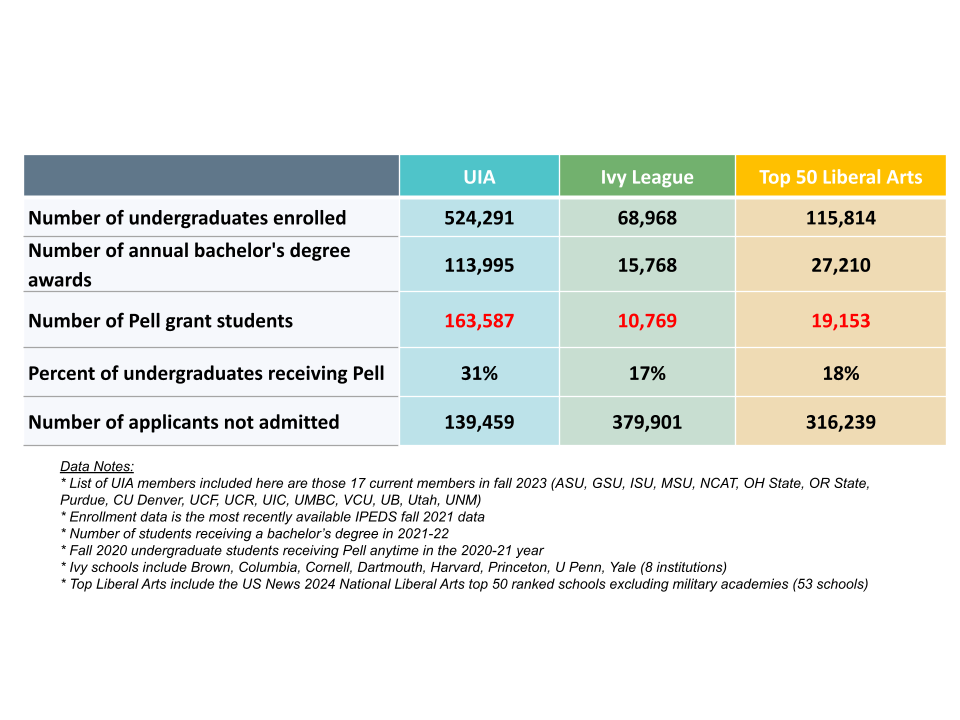
Innovation in Action
The UIA makes our events unique and powerful by prioritizing action and solutions over simply exchanging ideas. We take a workshop-style approach emphasizing hands-on collaboration to move ideas forward and build momentum that will carry on beyond the event.
Senior leaders, liaisons, and fellows work together to generate solutions, align priorities, and drive initiatives. Participants have time and space to engage directly in problem-solving, accelerating the integration of leadership strategies and institutional priorities. Our unique approach ensures that innovative ideas get translated into tangible outcomes across our institutions, fostering meaningful and sustainable change.
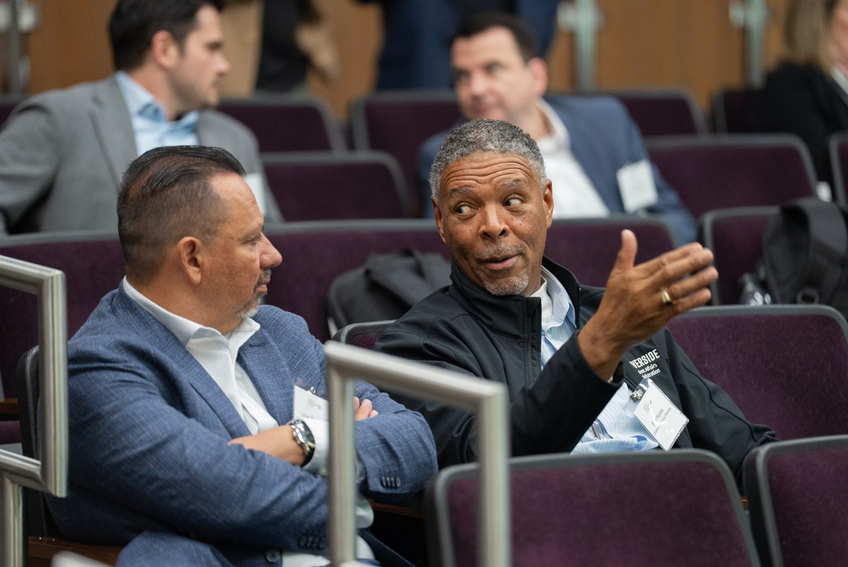
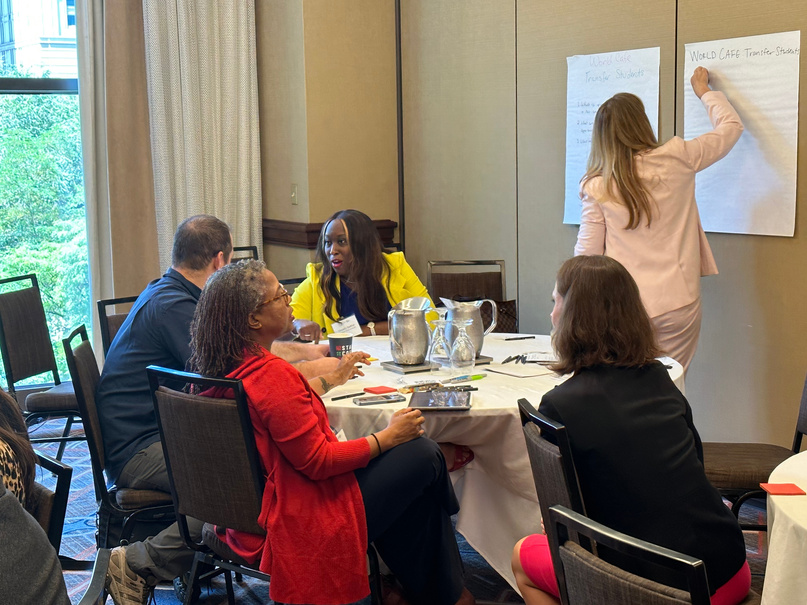
Leadership Alignment for Innovation
In 2023, thanks to the support of ECMC foundation and the partnership of Tyton Partners, we were able to design and facilitate a leadership alignment retreat for our presidents and chancellors to spend intentional time for strategizing about innovation implementation on campus with their respective provosts.
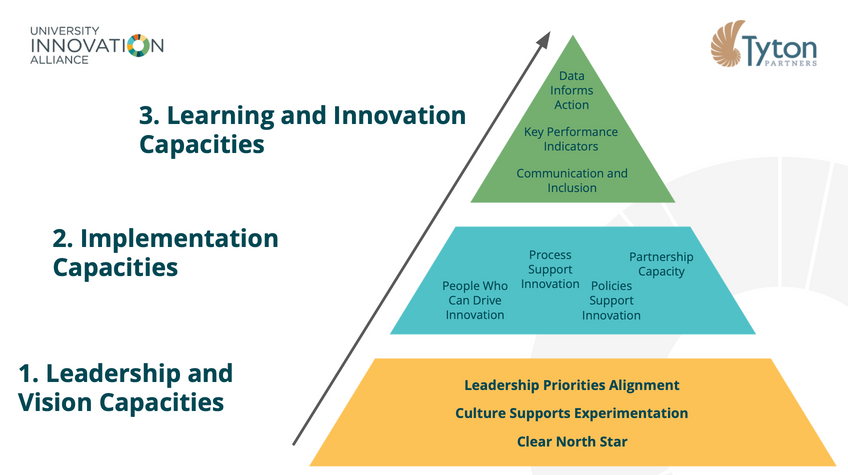
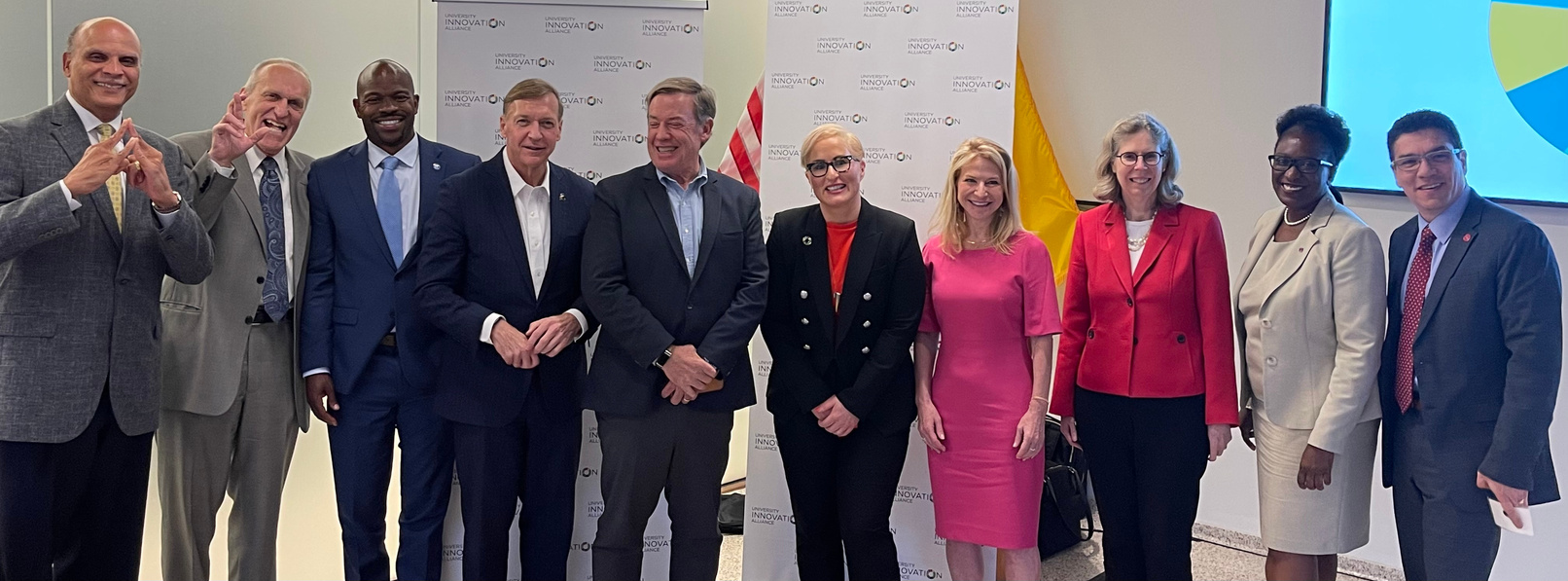
Innovation through Mentorship
The UIA Fellows Program is the cornerstone of the UIA’s approach to innovation. UIA fellows build each university’s capacity to engage in student success innovation and form vital links between campuses. As mid-level leaders, fellows benefit from the mentorship of more experienced UIA liaisons, gaining access to both senior university leaders and student-facing administrators and faculty. As they advance in their careers and expand their reach in academia, the UIA fellows program is a talent pipeline for innovative future leaders poised to create impact far beyond the UIA.
Our Work
Collaborative scale projects are what make the UIA an effective force for change. They bring focus and energy to our innovation work and demonstrate how universities can work together to solve problems and generate results that surpass anything campuses could accomplish on their own.
Successfully scaling innovations requires a total commitment to collaboration, which the UIA advances through our campus convenings and leadership retreats, providing dedicated space for campus teams to share challenges, test solutions, and keep expanding our innovation horizons.

Current Scale Projects
Providing financial and academic support for students retaking high-priority courses in which they were previously unsuccessful
Piloting interventions designed to improve outcomes and experiences for Black students.
Elevating and listening to student voices to drive change in policy and program design.
Enhancing Black student success, evaluating study habits, understanding sophomore students of color, and more.

Academic Recovery Initiative
In 2023 we launched the UIA’s newest ambitious scale project: a $3.5 million, 2.5 year initiative to scale Georgia State’s Accelerator Academy DFW academic recovery model across 10 additional campuses. The Accelerator provides tuition subsidies and microgrants for students to retake a high-priority lower division course in which they’ve previously earned a D, F, or Withdraw grade and offers wraparound academic support to participants through supplemental instruction and academic coaching.
Pilot data from campuses implementing the Accelerator in the first round, summer and fall 2023, showed 77% of students succeeding in their course retake efforts via this model – a 22 percentage point improvement over the historical 55% retake success rate for students not participating in the Accelerator.
In addition to improving the success rates of students, retention was also very high at just over 85% for students retained in the fall after completing their summer Accelerator course. We look forward to sharing more outcomes from subsequent terms as UIA campuses continue to test and refine how they implement the Accelerator approach.
Campus | TERM | COURSE |
Arizona State University | Fall | UNI 220: Mindset Connections |
Georgia State University | Summer | ENGL1101: English Composition |
North Carolina A & T | Summer I and II | Math 103: College Algebra, Math 131: Calculus I |
Oregon State University | Fall | CH231: General Chemistry |
Purdue University | Summer | MA 15300: College Algebra, CHM 11500: General Chemistry |
University of California, Riverside | Summer | BIOL 005A: Intro to Cell & Molecular Biology, CS 010A: Intro to Computer Science |
University of Central Florida | Fall | Organic Chemistry 1 |
University of Colorado Denver | Fall | CHEM 231: General Chem I, MATH 1010: Math for Liberal Arts |
University of Illinois Chicago | Summer | CHEM 122: Matter & Energy, MATH 180: Calc I |
University of Utah | Summer | MATH 1050: College Algebra |
Virginia Commonwealth University | Fall | PSYC 101: Introduction to Psychology |
We are grateful to Ascendium Education Group and the Frederick A. DeLuca Foundation for their support of this project.
Student-Centered Redesign

Building on a collective UIA effort launched in fall 2020, 14 UIA campuses are currently participating in the UIA’s Student-Centered Redesign Initiative and piloting new interventions designed to improve the outcomes and experiences of Black students.
Based on all we’ve learned from this project, in mid-2024 the UIA will release a playbook that will equip any institution to drive change focused on the needs of a unique student community.
CAMPUSES | PROJECT FOCUS AREAS |
Arizona State University, Michigan State University, University of Colorado - Denver, University at Buffalo, Oregon State University | Belonging & retention |
The Ohio State University, University of Illinois - Chicago | Coordinated care models & support utilization |
Purdue University | Inclusive advising experience & advisor training |
University of California - Riverside | First-year and transfer college transition |
University of Utah, Virginia Commonwealth University | Improving career readiness |
University of New Mexico | Graduate school pipeline |
UMBC - University of Maryland Baltimore County, North Carolina A&T State University | Persistence & graduation in STEM |
We are grateful for a grant from the Michael and Susan Dell Foundation for their support of this project.
Listening Lab for
Campus Transformation
Led by colleagues at Michigan State University, the UIA has designed, implemented, and is now scaling an adaptable but systematic approach to elevating and listening to the student voice to drive changes in policy and program design. The Listening Lab has developed UIA focus group protocols, moderator training modules, and actionable insight report templates designed to help institutions uncover and address barriers to equitable student success that might not appear in large survey datasets. In 2023, seven participating pilot campuses conducted 74 focus groups with hundreds of students. Data collection and analysis will continue in early 2024, and the UIA will release a public playbook this summer designed to equip any campus to lead with empathy and take action to support student success.
CAMPUSES | FOCUS POPULATIONS |
Michigan State University, University of California - Riverside, Georgia State University | Transfer students & transfer students of color |
Georgia State University, Purdue University | First-year students |
University of Utah, Michigan State University | Student parents & caregivers |
Arizona State University | Online students |
North Carolina A&T State University | Readmitted students |
University of Utah | Students planning for or returning from extended leave |
We are grateful for a grant from the Kresge Foundation to support this work.
Doctoral Research Fellows
We supported a second cohort of emerging scholars who are working with faculty advisors and UIA liaisons to conduct research on student success at their institution. You can learn more about the 2022-2023 cohort’s research here. Four UIA campuses are now participating in the second round of this collaborative effort. Their projects this year focus on:
- Enhancing Black student success by understanding their experiences before college;
- Assessing the role of study habits on students’ beliefs and academic performance;,
- Persistence of Students of Color Through the Sophomore Year;
- Providing academic success support interventions for first-year students; with challenging first semesters through tailored courses and programming.
Support from the Carnegie Corporation of New York makes this work possible.
University Innovation Lab
The UIA Lab is designed to accelerate learning and idea sharing; diffuse innovative strategies; and provide broad support for implementers moving student success work forward on their campuses. 2023 was a year of rapid growth for the University Innovation Lab, as we experimented with resources and offerings ahead of a paid-subscription option that is now available nationwide.
Highlights from 2023 include:
- Increasing our user base by 89% by attracting a diverse array of roles responsible for student success innovation and implementation across UIA campus teams and staff.
- Supporting well over 500 members with a growing resource library and skill- and knowledge-building events throughout the year, including discussions, workshops, panels, and learning cohorts.
- Providing relevant content, as illustrated by the more than 800 lab downloads last year. Our most popular were Logic Models for Program Design and the Future of Advising.
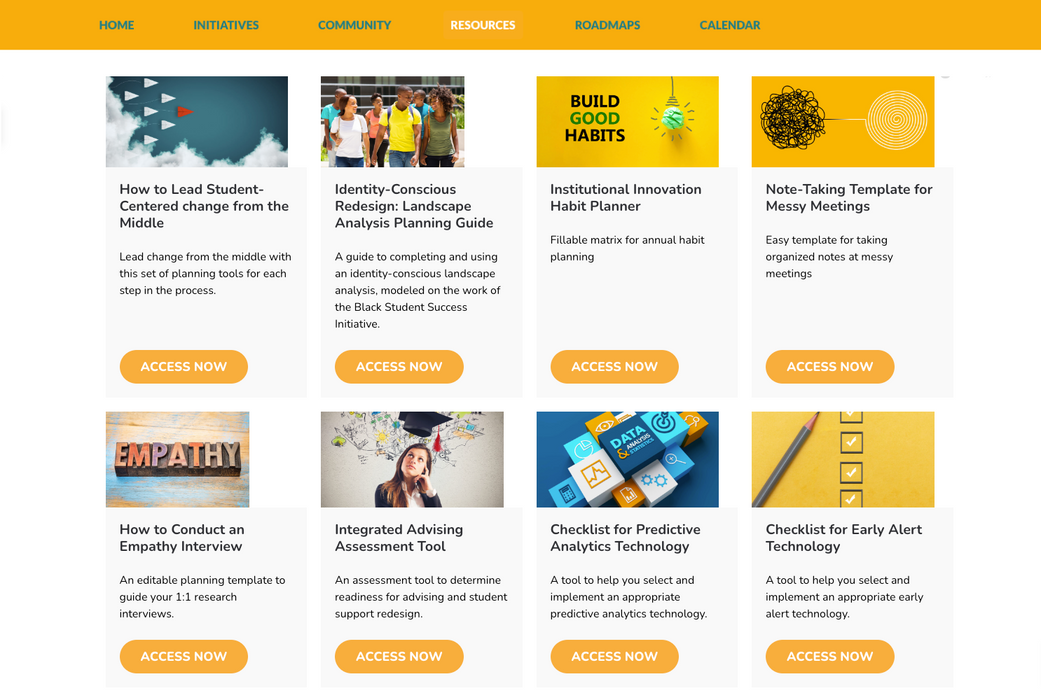
What I really like about being a Lab member is not only do I have access to the resources... but as I'm implementing those skills and implementing those resources, I get to also share the resources with my colleagues... I can say, 'Hey, you can find these same resources to implement in your own environment as well.’
- Lab member
Diffusion to the Field
The UIA elevates student success strategies, insights, and leadership examples from across the sector to redirect collective attention toward inclusion, collaboration, and innovation. Our active and growing social channels, podcast, and newsletter helps us share insights and learning with thousands across multiple platforms.
Newsletter
Each monthwe aggregate the best of what we’ve learned, heard and read, and we share it with you. In 2023 we increased the reach of our newsletter by nearly 30% , now with more than 10,000 subscribers and a 60% open rate, our readers can attest to the value provided in this monthly resource. We invite you to sign up and share with your networks.
Live Content
The UIA’s virtual diffusion efforts focus on elevating topics and guests that direct the field’s attention to issues and values we prioritize: student success, innovation, collaboration and change management. This approach enables the learnings from the UIA to reach and inspire higher education leaders and practitioners globally.
In 2023 we produced 42 episodes across 3 shows, 18 University Innovation Lab virtual events, and 2 Process Mapping learning cohorts:
- Our Innovating Together Podcast ended 2023 with 138 episodes, 4.8 stars, over 100,000 downloads and ranked in the top 2.5% of podcasts globally as ranked by Listen Score.
Livestream video content & shows:
- Weekly Wisdom: Quick interviews with sitting college presidents and chancellors
- Scholarship to Practice: Interviews with higher education scholars and researchers
- Innovation Spotlight: Interviews with experts on specific innovations
Lab Events: Webinars & workshops to help higher ed professionals learn student success innovation skills and strategies to make change on their campuses 2023, we also launched Learning Cohorts: 6-week learning opportunities that blend live discussion groups with an online course focused on skills needed to innovate for student success.
We are expanding the University Innovation Lab and our learning cohort offerings in 2024. You can learn more about campus subscriptions to the Lab on our website.
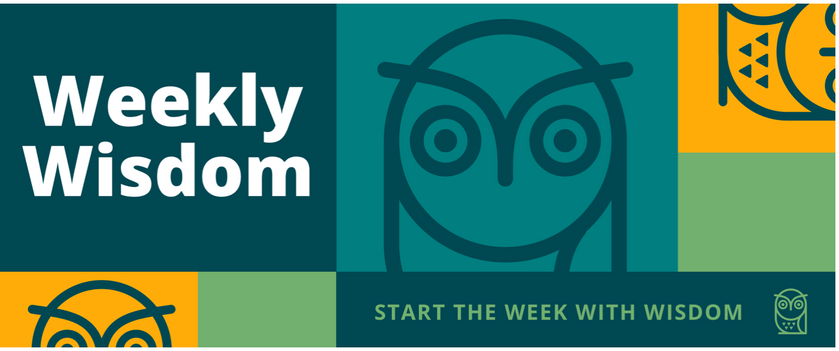
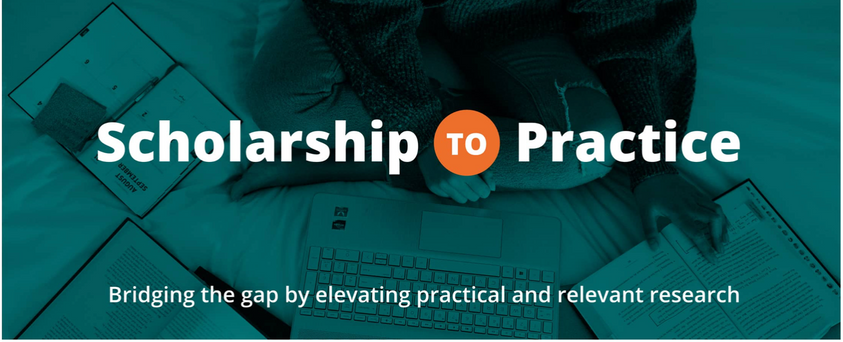
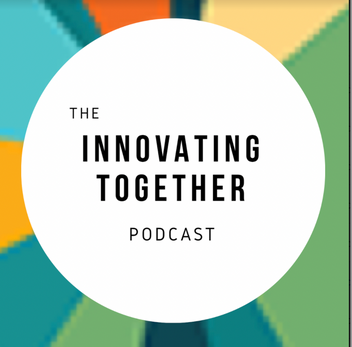
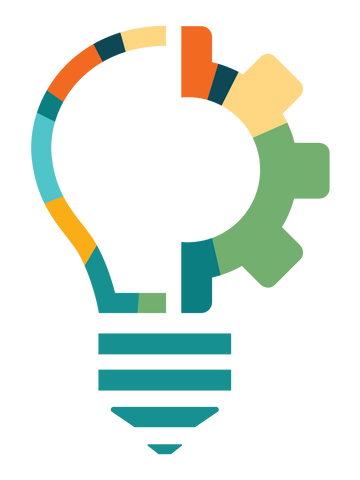

Earned Media
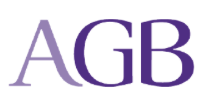
“Fostering Change in Higher Education”

“Coalition Of 15 Research Universities Awarded Grant To Boost Student Success In Key Courses”
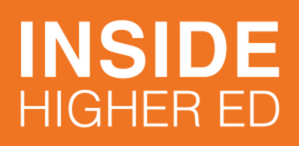
“College Completion Rates Remains Stagnant”

“Teaching: When It Comes to Burnout, Saying 'No' Matters”

“Nine Ways Funders Can Increase Diversity in Higher Ed in a World Without Affirmative Action”

“University Innovation Alliance Project to Address High DFW Rates in Gateway Courses”
UIA Board
The UIA is governed and led by a group of dynamic and visionary presidents and chancellors who embody our commitment to collaborative innovation that improves student success.
2023 UIA board members:
President Michael Crow, Arizona State University (Chair)*
President M. Brian Blake, Georgia State University
President Wendy Wintersteen, Iowa State University*
Interim President Teresa Woodruff, Michigan State University
Chancellor Harold S. Martin, Sr., North Carolina A&T State University
President Jayathi Y. Murthy, Oregon State University
President Mung Chiang, Purdue University
Interim President Peter Mohler, The Ohio State University
President Satish Tripathi, University at Buffalo
Chancellor Kim A. Wilcox, University of California - Riverside (Vice Chair)*
President Alexander Cartwright, University of Central Florida*
Chancellor Michelle Marks, University of Colorado Denver
Chancellor Marie Lynn Miranda, University of Illinois Chicago
President Valerie Sheares Ashby, UMBC - University of Maryland Baltimore County
President Garnett S. Stokes, University of New Mexico
President Taylor Randall, University of Utah
President Michael Rao, Virginia Commonwealth University
*denotes executive committee member
UIA Liaisons
UIA Liaisons are the essential engine driving our work. Their strategic guidance, insight, collaborative efforts, and selfless leadership power the UIA. Liaisons mentor, guide and supervise UIA Fellows, convene campus student success teams, and work on behalf of their presidents and chancellors to ensure organizational accountability.
UIA Fellows
The UIA Fellows program has become a premier early- to mid-career professional development and innovation training program in higher education. Fellows provide strategic innovation capacity to propel our collaborative work. UIA Fellows have gone on to serve in leadership roles on member campuses, to lead national collaboratives, to serve in faculty roles, and to work for research organizations. These leaders are the future of our sector.
By the end of 2023, there were 18 fellows, the largest group to date.
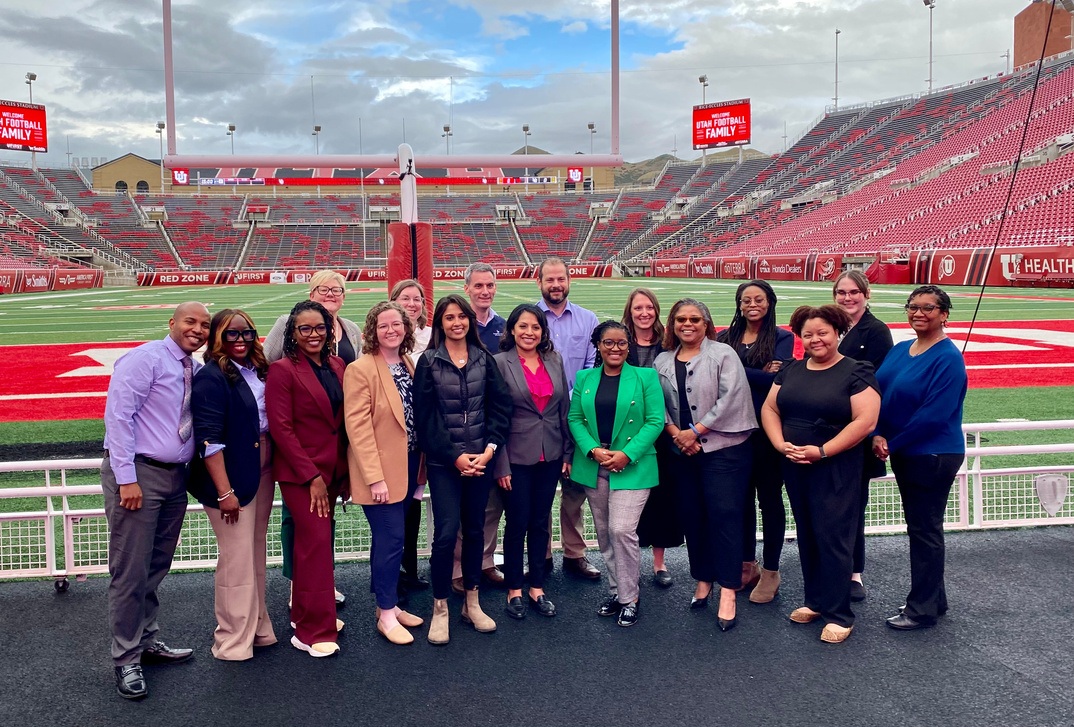
Looking Ahead
In 2024, we’ll be focused on developing and releasing playbooks to share what we’ve learned from our Student-Centered Redesign and Listening Lab projects, and on advancing our Academic Recovery project through a second year of implementation. We’re excited to launch our newest scale project focused on advancing learning innovation and addressing equity gaps in STEM courses. We look forward to sharing with you what we learn – and we want to hear what you’re learning, too. We hope you will join us as we look ahead to the future at the National Summit on Student Success Innovation October 23-25, 2024 in Tempe, AZ.
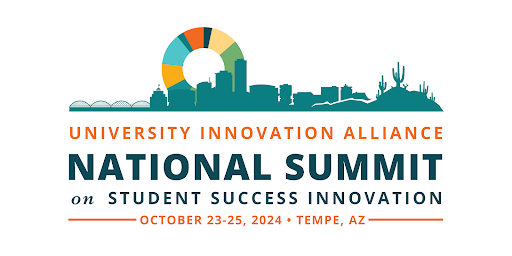
To support and extend our collaborative work, we’ve developed the University Innovation Lab to share tools, resources, and virtual learning opportunities across our network and beyond. We’d love to include you in our community. As we celebrate our first decade and enter the next, you can expect to hear more this year about our goals and plans for scaling the UIA’s impact.
Thanks for being part of our movement to redesign higher education around student success.
Thank You to Our Partners
The UIA gratefully acknowledges the 2023 philanthropic support that has made so much of our work possible.
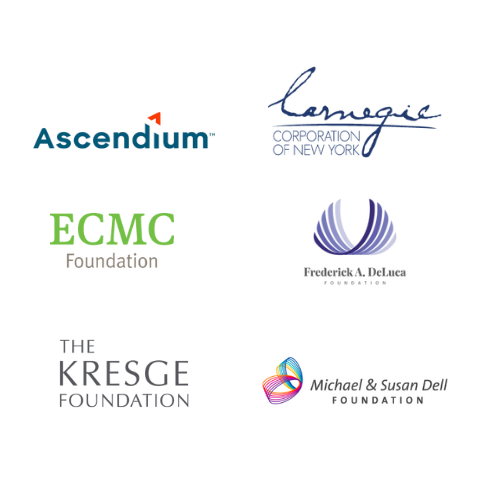

Most importantly,
to our member institutions
For your commitment to the UIA’s mission and to the students who inspire this work every day, thank you.
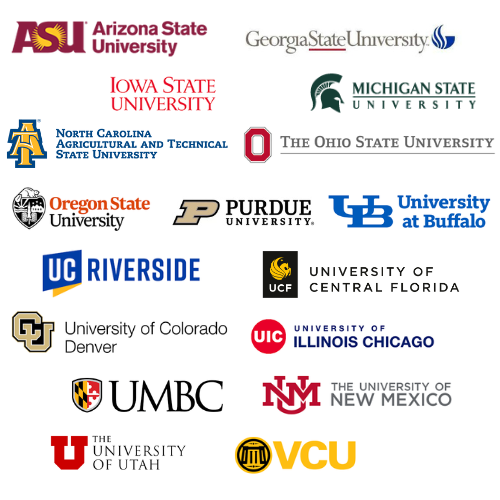

Engage with Us
